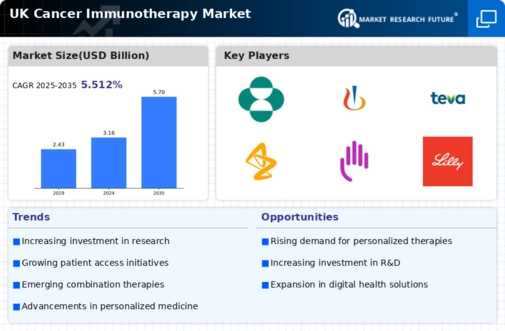UK Cancer Immunotherapy Market Summary
The United Kingdom Cancer Immunotherapy market is projected to grow from 3.16 USD billion in 2024 to 5.7 USD billion by 2035.
Key Market Trends & Highlights
UK Cancer Immunotherapy Market Key Trends and Highlights
- The market is expected to experience a compound annual growth rate of 5.51 percent from 2025 to 2035.
- By 2035, the market valuation is anticipated to reach 5.7 USD billion, indicating robust growth potential.
- In 2024, the market is valued at 3.16 USD billion, reflecting the current investment in cancer immunotherapy.
- Growing adoption of innovative therapies due to increasing cancer prevalence is a major market driver.
Market Size & Forecast
| 2024 Market Size | 3.16 (USD Billion) |
| 2035 Market Size | 5.7 (USD Billion) |
| CAGR (2025-2035) | 5.51% |
Major Players
Merck & Co, Novartis, Teva Pharmaceuticals, AstraZeneca, Bristol Myers Squibb, Eli Lilly, Johnson & Johnson, Regeneron Pharmaceuticals, Celgene, Roche, Amgen, GSK, Sanofi, Ipsen, Pfizer























